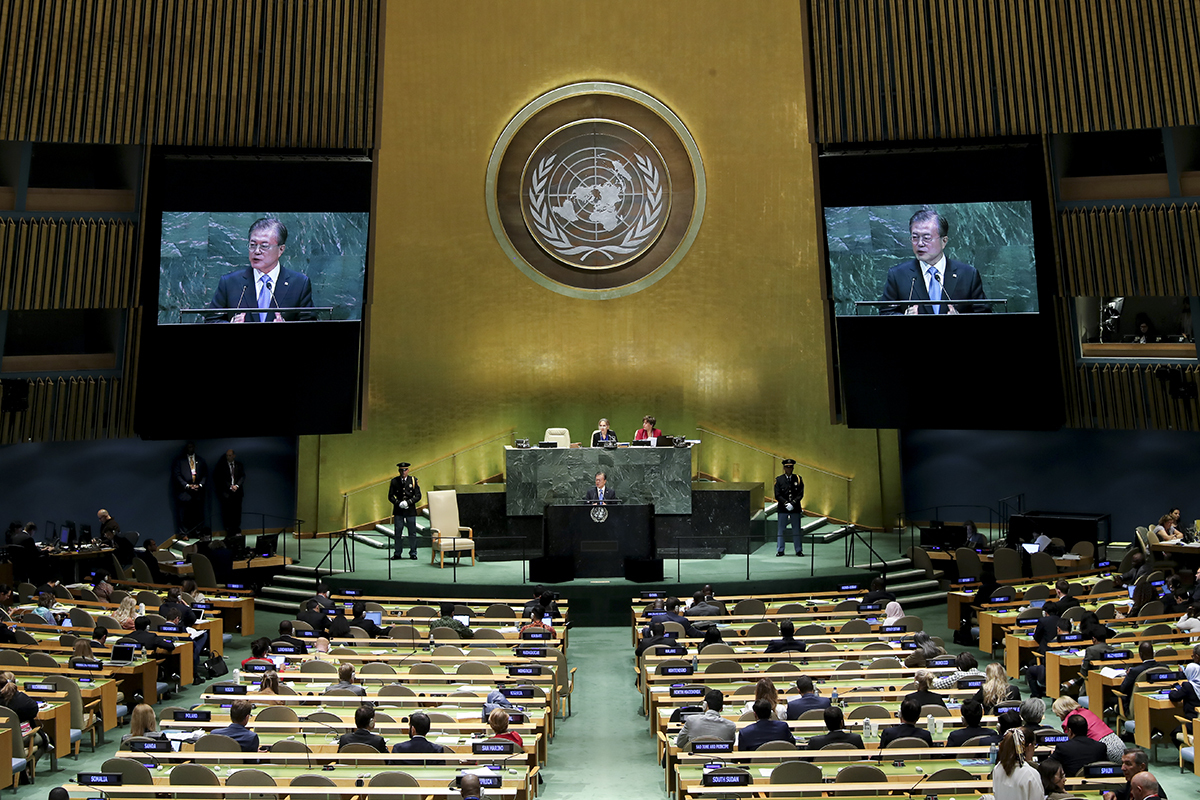President Moon Jae-in is weighing whether to attend the UN General Assembly set to be held in New York later this month in his renewed push to resume stalled talks with North Korea, according to Cheong Wa Dae officials.
“This is a significant year that marks the 30th anniversary of South and North Korea becoming UN members together,” a Cheong Wa Dae official said on condition of anonymity. “It would be very meaningful for the two Koreas to send a unified peace message on such a huge diplomatic stage.”
The official, however, declined to confirm the president’s trip, citing the sensitivity of the issue and other factors like COVID-19.
 |
President Moon Jae-in delivering his keynote speech at the 74th UN National Assembly in New York on Sept. 24 in 2019. (Cheong Wa Dae) |
The UN General Assembly is the biggest diplomatic gathering of the year. After last year's gathering was held online due to the coronavirus pandemic, this year more in-person meetings are expected to be arranged. The UN headquarters is still discussing the size and form of the event that kicks off on Sept. 21.
Moon has expressed his willingness to attend this year's event, putting emphasis on the symbolic meaning of the joint UN membership made on Sept. 17, 1991. During the trip, he is also likely to seek a summit with President Joe Biden amid the stalemate with North Korea.
With almost six months left before next year’s presidential election, Moon is making last-ditch efforts to revive his mediator role in the collapsed diplomacy between the US and North Korea.
Regardless of his attendance, he is expected to deliver a speech regarding the North amid a month full of meaningful anniversaries for inter-Korean relations.
Sept. 19 is the third anniversary of the third summit talks between Moon and North Korean leader Kim Jong-un in 2018, during which the leaders announced the Pyongyang Declaration, which contained commitments to ending hostile military activities against one another.
This year also marks the 50th anniversary of resuming inter-Korean talks. On Aug. 20 in 1971, the two Koreas started contact to resolve the issue of divided families since the 1950-53 Korean War and their first-ever working-level talks started on Sept. 20 on the occasion of the Chuseok holidays.
Upon the reopening of the inter-Korean communication hotlines in July, there were high expectations about holding a family reunion event during Chuseok this month but related talks could not even start as the North again refused to respond to the South’s calls in protest of the Seoul-Washington joint military drills last month.
Both Seoul and Washington have kept a low profile amid fresh signs of Pyongyang restarting its nuclear activity at the Yongbyon complex. Diplomatic sources say the two allies were already aware of that activity even before this week’s IAEA report based on satellite surveillance.
Yongbyon, a nuclear complex with a 5-megawatt reactor, is at the heart of North Korea’s nuclear program. The IAEA report said the reactor has been discharging cooling water since July, suggesting it is operational.
The South views the latest move as a strategic decision for the North to gain leverage in the upcoming talks. Washington also echoed the view, reiterating it was open to dialogue with North Korea without preconditions.
Lee Jong-seok, former unification minister, called the apparent restart of the Yongbyon complex “nothing unexpected” in a peace forum Tuesday.
“The US shows a tendency of returning to strategic patience and with its objective of sanctions relief not realized at all, North Korea could seek low-level provocations in the areas where no promise has been made,” he said, urging the US to come up with a more realistic, practical approach to dealing with North Korea.
By Lee Ji-yoon (
jylee@heraldcorp.com)







![[Today’s K-pop] Blackpink’s Jennie, Lisa invited to Coachella as solo acts](http://res.heraldm.com/phpwas/restmb_idxmake.php?idx=644&simg=/content/image/2024/11/21/20241121050099_0.jpg)
